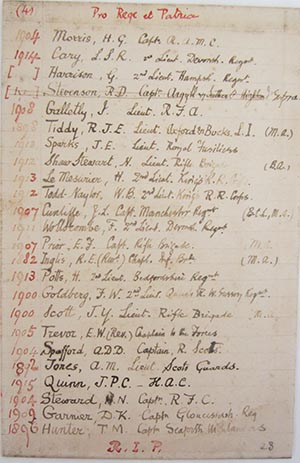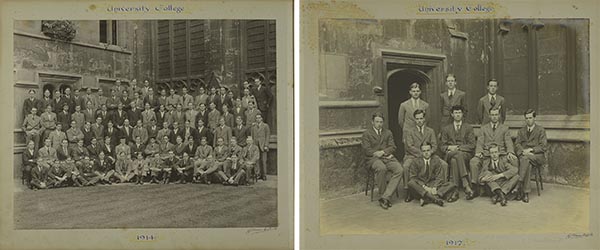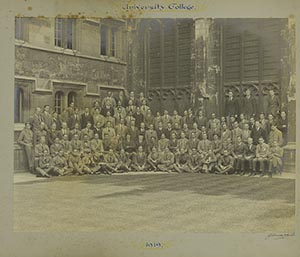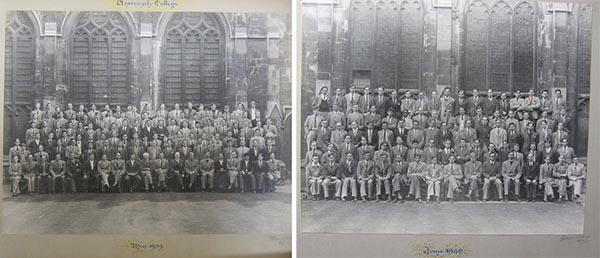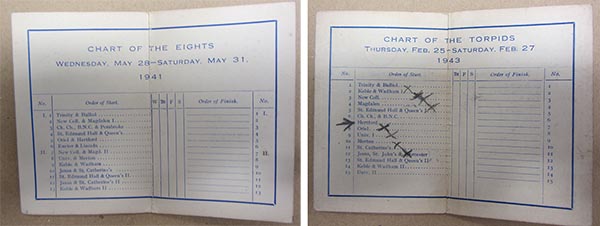Univ: plague & war part 3
Part 3: The First and Second World Wars
Since the 1640s, no fighting has occurred near Oxford. On the other hand, in the 20th century, the University and its Colleges have had to endure two major world conflicts whose consequences had a deep effect on them, and to these I now turn.
The First World War
It is often said how unexpectedly the First World War broke out. At the end of Trinity Term 1914, Univ was still rejoicing in its First Eight going Head of the River, and looking forward to commemorating the 200th anniversary of the death of John Radcliffe in the autumn. In a former Univ Treasure, I wrote about that great First Eight of 1914, based on the photograph album of one of its members – you can read it here.
At the end of June, just after the end of term, Archduke Franz Ferdinand was assassinated in Sarejevo, and by 4 August Britain was at war. Oxford was then deep in the Long Vacation, and so there was no repeat of the exodus of the autumn of 1642, but during the next few weeks many members of the College eagerly joined up. Therefore, whereas in October 1913, the College had held 150 undergraduates, of whom 46 were freshmen, in October 1914 there arrived at Univ just 45 undergraduates, including 23 freshmen.
In May 1915, like other Colleges, Univ passed emergency statutes to suspend rules on Fellows’ residence, and to permit vacant Fellowships and Scholarships to remain unfilled. It was therefore possible for current students (and, indeed, Fellows and College servants) to go off to serve, and for young men to apply for places at Oxford, either as Scholars, Exhibitioners or Commoners, on the understanding that they would not take these places up until after the war.
178 past, present and future members of the College are known to have died in the war – almost a quarter of all those who had joined up. Among Oxford Colleges only Corpus Christi had a higher death rate. Two Old Members were killed in the very first month of the war, and almost every month brought news of another fatality. These figures, too, do not include all those men who were wounded, sometimes with life-changing results.
As with previous plagues and wars, it is difficult to reduce such numbers to a human scale, but in two past Treasures I have looked at some representative groups to provide at least some idea. If you return to the First Eight of 1914, you will see what happened to them during the war: two members were killed, but many of the rest were left damaged in one way or another. Then this second Univ Treasure looks at Univ men who were killed during the first days of the Battle of the Somme – read it here.
Just as in the English Civil War, members of Univ faced divided allegiances. During the previous few years, several German students had come to study at Oxford, and some of them came to Univ. One of them, Alexander Grunelius, had even helped create a “Hanover Club” in 1911 to foster Anglo-German friendship. In 1914 most of these German Old Members of Univ duly joined up to fight for their own country, and one of them, Rolf Wilhelm von Seldeneck, was killed in action. More about Rolf, and the memorial which was erected for him in our Chapel only as recently as 2018, may be found in this Univ Treasure.
The College knew all too well about its lost Old Members. Our then Master, Reginald Macan (who himself lost his only surviving son in the war), compiled lists of the latest fatalities, all written on the backs of copies of the College Grace, and pinned them up, presumably in the Chapel. A few of these survive.
Macan presided over a College growing ever smaller. Student life ground to a halt: there were no sporting fixtures, and no JCR Presidents were elected in 1917 or 1918. These effects can be seen from these two College photographs (below) taken respectively in the summers of 1914 and 1917 (as well as the group photo from 1918 seen in the first feature in this series). The 1917 photograph has an additional interest in that, standing in the back row on the right is the future scholar, novelist and theologian CS Lewis. Lewis came up in 1917, and was allowed to do some study before he did his formal training. His letters from this period (published in the first volume of the edition of his correspondence by Walter Hooper) are well worth reading for his reflections on College life during wartime.
Just as in the 1640s, however, the College was not left empty. First of all, 90 High Street was turned into a Recruitment depot. Next, the College was used as an extension to a hospital which had been set up in the Examination Schools. First Durham Buildings were taken over, then Radcliffe Quad, and finally part of the Main Quad. Eventually such undergraduates and Fellows as were left were all squeezed into Staircases I-III on the west range of Main Quad.
As with the Wars of the Roses and the English Civil War, armed conflict also brought financial loss. In 1913, Univ derived £8755 6d 1d – almost half its annual income – from money received from undergraduates for their accommodation, food and drink, and teaching. When most of our students went off to war, so this source of money plummeted. In 1918, the College was only receiving £925 13s 11d from internal sources, so that its total income had almost halved.
After the Armistice of November 1918, the College was able to recover quickly. Both in January and April 1919 many men who had been awarded places at the College since 1914 and whose entries had been deferred could now come up, having been demobbed. This photograph of the College taken in the summer of 1919 shows how large the College had become. Indeed, far more people matriculated from Univ in 1919 than any previous year (134 in all) – a number not surpassed until 1982. The Univ members of 1919, however, only included a handful of undergraduates who had been up in the summer of 1914 and who chose to return. That handful inevitably found themselves teach long-interrupted College traditions to the freshers or recreate College societies.
Special regulations were created to arrange the conferral of degrees on students whose academic careers had been interrupted by war. People who had been up at Oxford in 1914 were entitled to take special war degrees, whether or not they returned to compete their courses. For students now taking up the places awarded them during the war, the University devised special two-year BA courses. Academically ambitious students, like C. S. Lewis, could still take Honours Degrees in the usual way, but many students were content to curtail their time at Oxford, in order to restart their lives more quickly.
As College numbers increased, so our then Bursar (and its Classics Fellow), AB Poynton, took daring steps to restore its finances. Like many other College Bursars in Oxford, Poynton decided that it was time for the College to divest itself of much of its agricultural land and invest the proceeds. Therefore, in the years immediately following 1918, the College sold off at least half of its land. Among the most significant sales were the estates in Montgomeryshire bequeathed by Robert Dudley, Earl of Leicester, in 1588, and properties in and around Pontefract given by John Freeston in 1592. The results certainly paid off. In 1919, Univ received £8026 15s 4d from its estates, and £1344 16s 3d from investments. In 1923, after the great sell-off, those respective figures were £7789 9s 6d and £4329 6d 9d.
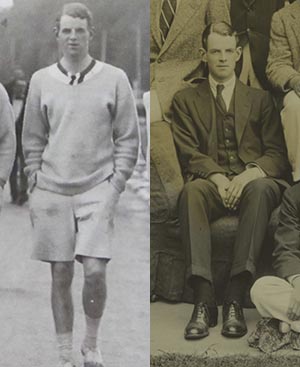
Charles Rowlatt – 1914 & 1919
We should end this account of the First World War, though, by returning once again to the First Eight of 1914, and its stroke, Charles Rowlatt, who was alone among the crew in returning to Univ in 1919. When on active service he was so badly injured that he spent the rest of the war working in the War Office. Rowlatt enjoyed a successful later life, teaching at Eton, and rising to become Vice-Provost, but his obituary in the 1959 Univ Record says that he never completely recovered from his wounds, and speaks of his being “not an easy man to know”. Two photographs of Rowlatt from our archives reflect something of this. One, taken in 1914, shows Rowlatt striding along the banks of the Isis, and the other shows him sitting with the 1919 First Eight. Rowlatt, however, was not part of that crew, but instead was their coach, his rowing career now over. The difference between these two images tells us something of what people of his generation endured on the front.
The Second World War
Unlike the First World War, the Second World War did not come as a surprise: some people from that age have even observed that its outbreak was almost a relief after all the tension beforehand. Therefore there was time for the University to prepare, and to negotiate with the Government about how its buildings and the Colleges could be used. Some College were to be requisitioned, and others would remain open. Univ was one of the latter, but members of Merton and Keble spent at least some of the war in Univ, as their own buildings were requisitioned. One of these Mertonians was Keith Douglas, one of the Second World War’s greatest poets.
The great emptying of the Colleges seen in 1914-18 did not recur in 1939. This time undergraduates reading certain subjects like medicine or chemistry were declared exempt from military service, as they were contributing to the war effort in other ways, and other students were allowed at least to start their courses until they were called up. From 1942 other students could come up to Oxford on six-month cadet courses, which combined military training with academic study, and the offer of a full-time place at the end of hostilities. Numbers in the College, therefore, did not fall as steeply as in 1914, as these group photographs of College members in the summers of 1939 and 1940 show.
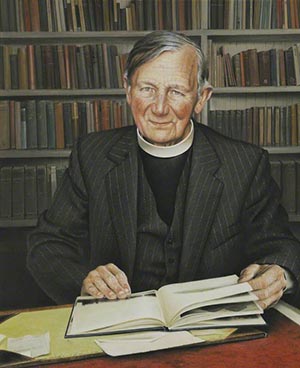
John Wild, Chaplain
As in the First World War, however, Univ occasionally put up visitors who had no University links. Evacuees from Ashford, Kent, spent some time in the College in September 1940, and there are photographs in the archives from this time showing clothes lines hanging in Radcliffe Quadrangle. Some more evacuees came from Bristol in September 1941.
Once again, the College lost some Fellows to active service. The Classics Fellow, Freddie Wells, worked for Naval Intelligence, while a young JRF, Harold Wilson, was seconded to Whitehall. Another young Fellow, though, the Chaplain John Wild, was exempted from active service on health grounds, and he played a crucial role in wartime College life. Many Old Members from that time have spoken or written to me of Wild with great affection.
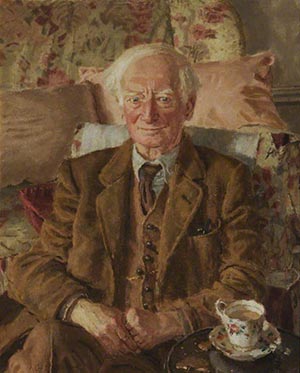
Sir William Beveridge
Our Master during the Second World War was Sir William Beveridge. His most famous wartime activity, of course, is his great report into social welfare, published in 1942. From a College perspective, however, the composition of the report and its aftermath resulted in Beveridge of necessity spending ever more time away from College affairs, so that much basic administrative work fell on the shoulders of John Wild. It was in large part because of his services to the College at this time that Wild succeeded Beveridge as Master in 1945.
Because there were more undergraduates resident during the Second World War than in the First, it proved easier to maintain some continuity in sports clubs and societies. Thus the University College Musical Society remained in existence throughout the war. One new society was born at this time: under the auspices of a freshman (and future Fellow) Peter Bayley, the Univ. Players was created in 1940. Meanwhile sports continued to be played, even if, because of smaller numbers, Colleges sometimes had to pair up. Univ’s usual “pair” was Merton. These two race cards for Eights Week 1941 and Torpids 1943 shows how rowing continued during the war, with Univ and Merton fielding a joint crew in 1941.
A fuller insight into College life in 1939-45 can be found in an article which I wrote on the subject for the University College Record in 2005, to mark the 60th anniversary of VE Day. This was based on reminiscences sent in to me by Old Members who were up at that time. Almost all those Old Members have since died, and I now realise how fortunate I was to correspond with them when I did. But their lively memories, sometimes amusing and sometimes sad, of life in the College, the terrible food, the student jokes, the formidable Lady Beveridge, and the tragic murder of 1940, can all still be read in this PDF.

Second World War Memorial, Univ Chapel
Just as in the First World War, so in the Second, people left in College had to be prepared for bad news from the front – rightly so, for the Second World War Memorial in our Chapel bears 89 names. Some Old Members from the 1930s and early 1940s, themselves now dead, have stood by me in front of that memorial to remind me how many of their friends are on it.
The Second World War, however, brought a fresh danger, unknown to Oxford before. There had been some air raids and naval bombardments of civilian targets during the First World War, not least in London, but by 1939, bomber aircraft had become much more robust, and their effects more alarming, as had been seen during the Spanish Civil War.
There therefore remained for much of the war a serious threat that Oxford might face bombardment, especially after the onset of the Blitz in autumn 1940. At Univ, as with all other Colleges, undergraduates had to take their turn in nightly firewatching, sitting on College roofs, and on the watch if an incendiary device fell. Every night students took their turn, some even being given board and lodging to carry on their work throughout the vacations. Some water tanks were even dug in the College’s quads and gardens, so that water would be to hand should an incendiary bomb fall.
Oxford, however, was fortunate: in spite of the Morris works in Cowley, the city was never bombed. But throughout this period no one was to know that fact, and these nightly vigils remind us of a perpetual tension which never quite went away.
As in 1919, so in 1945 there were a great many members of the College eager to resume their studies. At least this time, almost all the returning veterans had spent at least some time at the College. Their return was also more carefully managed, in large part because so many more troops were needed to oversee the postwar world, and national service had been introduced. Therefore, whereas in 1919, there had been a great single rush of returning undergraduates, demobbing now took place more gradually, so that some of the pre-1945 students did not actually return until October 1949.
Not all wartime students returned: some had found other careers. One such was Warren Misell, who had come up on a cadet course in 1944. While on active service Misell discovered his talent for acting, and under his stage name of Warren Mitchell enjoyed a most successful career, not least for his memorable portrayal of the curmudgeonly bigot Alf Garnett.
Normality did not return at once: rationing, for example, was not completely lifted until the early 1950s. The food was an unwelcome surprise for some war veterans, when they discovered that a civilian’s rations were smaller than a soldier’s. There is a story that once John Wild had to lay out on a table before some disgruntled students exactly what a single person’s rations were, in order to make them believe it.
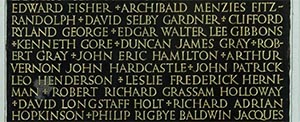
Hamilton’s name seen centre image
However, we need to turn our minds back to the 89 names on the War Memorial, and perhaps to one name in particular. In September 1949 the new Second World War Memorial was dedicated by the Dean of Windsor (and student friend of Prince Felix Yusupov), Eric Hamilton, who had come up in 1909. Not only had Hamilton seen many of his Univ friends die in the First World War, but among the names on the memorial which he now dedicated was that of his only son, John Eric Hamilton, who had come up to Univ in 1941, and been killed in Italy in 1943. The tragedy of the two Hamiltons speaks for many families who lost members in both world wars.
This feature – along with Part 1 and Part 2 – were written in the midst of the COVID-19 pandemic, and we have yet to know when or how it will end, and where we will all find ourselves when normal life returns. But perhaps if there is a lesson to be learned from the past, it is that, no matter how bad things have become, thus far University College has always shown a great resilience to recreate itself. We must hope that this will happen once again.
Robin Darwall-Smith, Archivist

